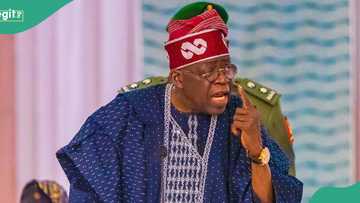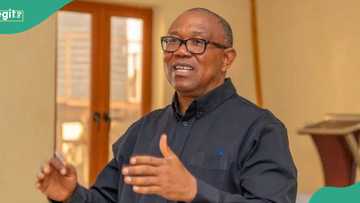- Former Speaker Yakubu Dogara described Tinubu’s tax reforms as a “survival pact” to stabilise Nigeria’s struggling economy
- The reforms according to Dogara, consolidate 16 fragmented tax laws into four major Acts, aiming to protect the poor, empower businesses, and ensure fairness
- The former speaker stressed that success depends on transparency, equity, and public trust
Former Speaker, House of Representatives, Yakubu Dogara, has termed President Bola Tinubu’s latest tax reforms a firm “survival pact” for Nigeria’s struggling economy, assuring that they are not punitive taxes on Nigerians.
The former speaker stated this in delivering the first ‘Distinguished Parliamentarian Lecture’ organised by the House of Representatives Press Corps on Tuesday, September 16, in Abuja.
Source: Facebook
Dogara also referred to the reforms as “the most ambitious fiscal shake-up in decades,” emphasising how vital they are in stabilising the economy after decades of what he termed “voodoo economics” by past administrations.
Economic crisis forced quick action
Dogara explained that when Tinubu took office in 2023, the economy was already close to failure as a result of irresponsible actions like printing N22.7 trillion as “means and ways,” twin exchange rates that made instant billionaires overnight and crude oil sales collateralised with loans.
Something had to be done on day one to avoid economic implosion, nay, revolution. Progress is not automatic; it has to be fought for. President Tinubu stood firm in the face of stout resistance by vested interests,” he added.
Harmonised tax framework introduced
The Speaker then observed that the Presidential Committee on Fiscal Policy and Tax Reform chaired by Professor Taiwo Oyedele brought 16 fragmented pieces of tax bills together into four major Acts: the Nigeria Tax Act, Nigeria Tax Administration Act, Nigeria Revenue Service Act, and the Joint Revenue Board Act.
He described the architecture as new and harmonized, which is designed to shield the poor, empower entrepreneurs, empower investment, and maintain equity.
Taxation as covenant of trust
Dogara assigned citizens the responsibility of looking at taxation as a covenant of trust between government and the governed.
“Reform is not a matter of raising rates but raising trust. When citizens see where their Naira is going, roads, power, hospitals, schools, they will pay voluntarily. This reform should be a covenant: citizens pay responsibly, government spends wisely,” he said.
Reforms scored by transparency and fairness
He added that the success of Tinubu’s reform, however, could not be measured through the quantum of revenue but through the level of transparency, fairness, and national competitiveness achieved.
Dogara: Press plays critical role in reform success
Mr Olufemi Olarinde, Special Assistant to the FIRS Chairman on Tax Policy, reiterated the role of the media in facilitating reforms to sail successfully.
The reforms were received by House of Representatives Speaker, Tajudeen Abbas, as a bold step towards reducing compliance complexity, increasing the tax base, and easing burdens on ordinary Nigerians.
The Speaker’s delegate, Hon. Akin Rotimi Jnr, termed the unification of the collection of taxes as a big step towards promoting efficiency, equity, and transparency.
Civil society urges accountability
The Civil Society Legislative Advocacy Centre (CISLAC) supported the reforms, calling for transparency and fairness in implementation.
Executive Director Auwal Ibrahim Musa Rafsanjani said, “Nigeria loses significant revenue to tax avoidance and evasion.
A unified, transparent system is urgently needed to serve citizens’ interests and close loopholes.”
Gboyega Onadiran, Chairman of the House of Representatives Press Corps, noted that the lecture aimed to clarify national issues, including taxation, and to demystify the workings of the legislature, often the most misunderstood arm of government in Nigeria.
Source: Legit.ng



